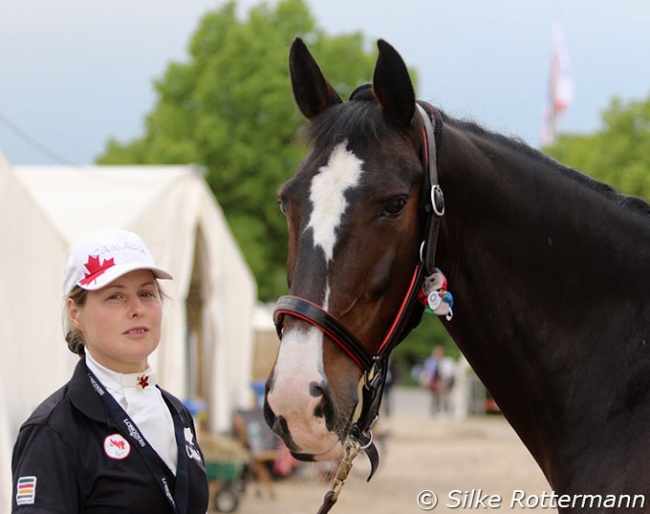
Canadian Roberta Sheffield, a British based Grade III dressage rider, is no newcomer to the international para scene, having already finished 4th in the freestyle finals at the 2014 World Equestrian Games and represented Canada at the 2016 Paralympics in Rio and 2021 Tokyo Games.
On her way to the World championships in Herning (DEN) later this year, she more recently celebrated international success at the CPEDIs in Deauville (FRA), Waregem (BEL) and Mannheim (GER) with an uncommon looking mare she once bought semi-feral for very little money from a field in England.
Fairuza is the living example that, although also in para sport the horse power becomes increasingly essential, good training can still make an unusual horse competitive and turn it in an international winner.
Silke Rottermann sat down with Roberta at the CPEDI Mannheim for this interview.
SR: I have a weak spot for anything Gelderlander in the dressage ring, so Fairuza caught my eye while watching the Tokyo Paralympics. For how long are you together now?
RS: I bought her when she was six, back in 2015. She was semi-feral and living out in a herd with about 100 other horses at a breeder who bred Gelderlanders and Friesians for private and show driving.
SR: That is a most uncommon place to go and look for a dressage prospect. How did you get there?
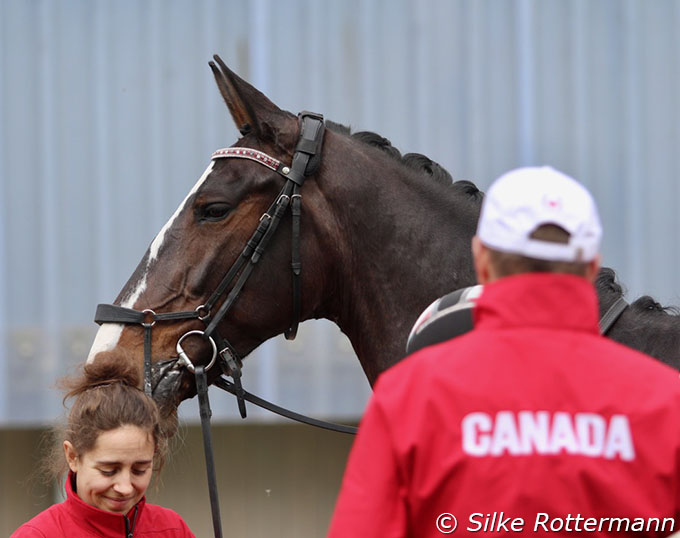
RS: The Canadian team did a European tour in 2015 and I came back from that tour and was really jaded. I needed a new challenge and I was looking through Horse&Hound magazine and they had an advert of somebody advertising warmblood-Friesian crosses.
I phoned them and thought I get myself such horse. I got down there and there was a field full of Gelderlanders. A flood of Gelderlanders, you might say. We went out and were looking at different family groups. They were looking differently, but they were all driving horses. There was a group of brown ones and "Wonky" was in that group. The boys herded this group and brought them down through the yard, pushed 5-6 horses into a stable and slammed the doors. They jumped at Wonky’s head to put the head-collar on and handed me the mare. That’s how I got Wonky whom I took home the same day.
SR: May I ask how much you paid for Fairuza?
RS: 700 pounds. 1500 for both because we also took her sister whom I sold to my stable owner later. Both live out in the field together to this day.
SR: So you got an uncommon horse very cheaply and she reached the level she is today entirely through good training. Which were your main influences the past years when you trained Wonky?
RS: Originally, back in the days, after university I was a working pupil for Gareth Hughes for two years. He gave me a grounding in dressage. Before I trained for Tiny Clapham (1984 Olympic team silver medalist) who was an eventer. I was also showing lots of Welsh Cobs in the UK. So I had very good training, but it wasn’t specific dressage. It was Gareth who asked me why I didn’t do para. He kind of got me into it. After him I had the opportunity to train with Arthur Kottas. For many years I did that when he came over and he was fantastic.
Because Wonky is quite difficult to work through her back because of her shape, I took her into training with Gerd Heuschmann when he came to England several times. But Wonky now gives you a great feeling, her energy and how available she is to you. She is really soft, she swings and doesn’t jar you at all.
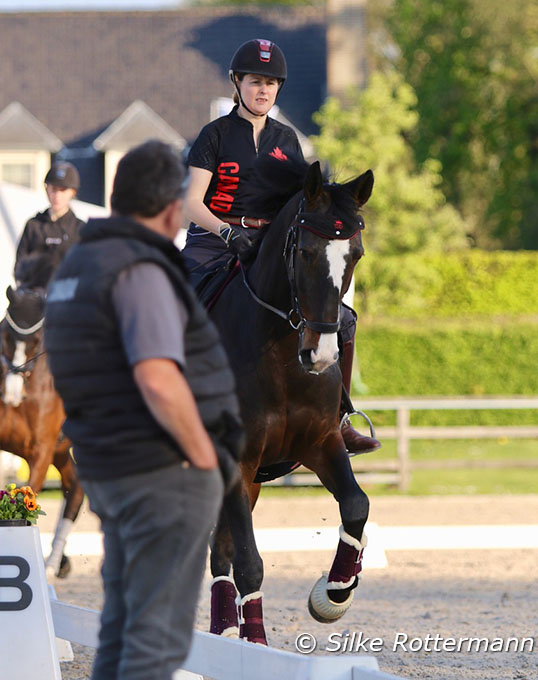
Clive Milkins after their arrival in Waregem 2022
RS: I truly believe in that a horse should have a good time. I am a lot out on the roads with her, she’s going into the field with her sister over the day. So Wonky is living a very normal life.
SR: Do you have a regular trainer at the moment?
RS: Yes, Clive Milkins who is the Canadian technical director. He helps me a lot, having access to Clive is fantastic. He lives in Bristol, but he travels up to me in Lincolnshire. For the last five weeks I have been based with Volker Eubel in Germany which has been a fantastic experience. I have already been there before the pre-Tokyo quarantine at Aachen when corona restrictions made it quite complicated to get into Germany. Clive, Wonky and I stayed at Volker’s before Aachen last year and he was so welcoming. There I could switch off from the outside world and be immersed all day long in good training, good riding. So I exactly knew where I wanted to go to train this year.
SR: Would you say that in para dressage you can still succeed with a really cheap horse if the training is correct? Do you also think this depends on the Grade in which you start in?
RS: When I bought Wonky I was in Grade IV and I looked at her walk and jog, it didn’t cross my mind that I wouldn’t have a (natural) canter. So I am absolutely lucky that I am in Grade III now where I do not need a canter.
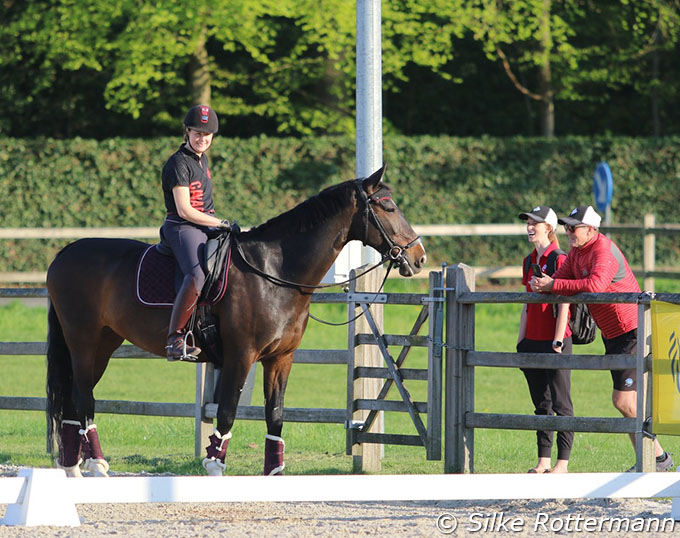
We see so many new riders in para sport and the horse power gets bigger and bigger, although I love that the sport is growing and the challenge that comes with it. And then we see horses like Martina Benzinger’s grey (Nautika) in Grade I who are not the hugest movers, but can still be winning. And it is a real art to train a Grade I horse. Every horse’s walk is so precious and it gives you a snapshot of the quality of its training.
Generally I think it is exciting that two of the emerging horses of this season are not „standard warmbloods“. It bodes well for the sport for the future, we need to keep diversity as well as keeping the emphasis on the quality of training, the harmony and partnership so the sport does not descend into a horse power auction project.
SR: I went to my first para show here in Mannheim eleven years ago and I have the feeling the quality of horses back then was a universe away from those who are competing here this week. Is it more and more necessary to get proper sponsorship, to have private engagement of horse owners if you want to be competitive in para dressage without having a big personal budget?
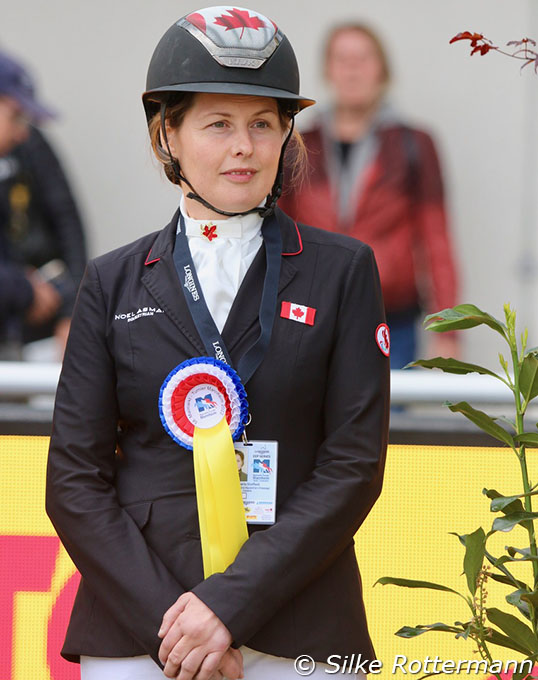
Mannheim
SR: What role does success play in that process?
RS: Success is always nice, but for me that daily work and partnership with my horse is the reason for doing it. To represent you country is an incredible honour and it is just an amazing privilege to have that life.
SR: The quality of training to me is sometimes an issue in able-bodied dressage. I personally have a problem with judges who mark a well-trained horse the same way as one that has not been trained classically, but is a spectacular mover.
RS: That’s an issue indeed. The judges shape the sport and in the end they are a kind of welfare guardians. Yes, the riders are responsible for the training of their horses, but the judges for what they put out.
And it is an issue indeed that huge movers might outclass well trained horses of lesser quality, but it is also an issue that some riders have their fantastic PR teams so people think they are amazing when in reality they maybe should look a little bit closer.
SR: Does this PR approach apply for para sport as well?
RS: There are some who have invested heavily in their PR as part of their strategy which of course is good for them. I do my socially media because it is important to the business side of what I do. I coach riders and that’s how I earn the money to keep the show on the road.
SR: I saw in Waregem that Fairuza can also piaffe really well. Is it your aim to get to a higher level in able bodied sport?
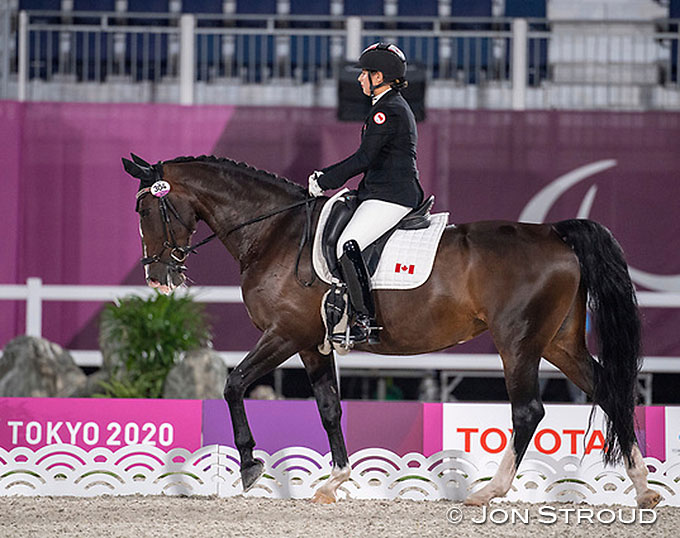
Tokyo (Photo © Jon Stroud)
SR: Do you have an idol who inspires you?
RS: My childhood idol was Dr. Reiner Klimke and he still is my inspiration. I have many of his books which he signed for me at Goodwood when I was a little kid. Is shall never forget that day. The funny thing is that Volker Eubel was trained by Reiner Klimke for 12 years. So when I found out that Klimke was the root of Volker’s training, I found it just phenomenal. So somehow we’ve come full circle.
Text and Photos © Silke Rottermann
Related Links
Canadian Paralympian Roberta Sheffield Embarks on European Tour
Roberta Sheffield: Lessons Learned from Major Games and Horses Past